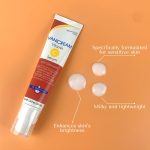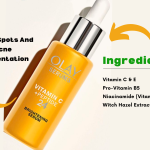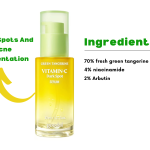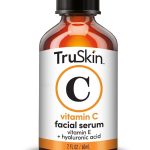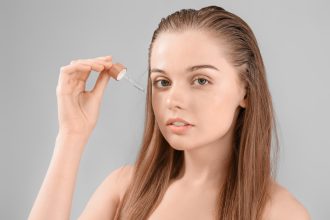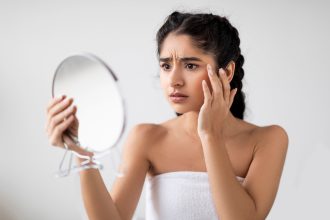Everyone believes that beautiful skin starts with the right ingredients. One of the most powerful ingredients for achieving a flawless complexion is Vitamin C. Vitamin C has been used for decades to improve skin texture, Prevent premature ageing, And brighten the complexion. However, Not all types of Vitamin C are created equal. In this article, We’ll discuss the six most effective types of Vitamin C for skin perfection and how you can use them to achieve your best skin yet.
6 types of Vitamin C compared – which one is right for your skin?
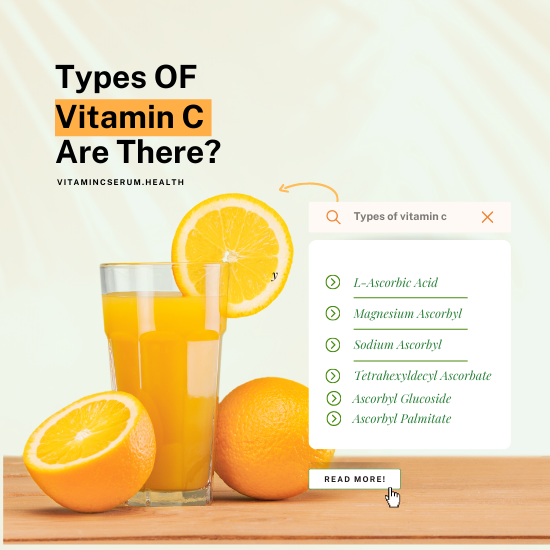
- L-Ascorbic Acid
- Magnesium Ascorbyl Phosphate
- Sodium Ascorbyl Phosphate
- Tetrahexyldecyl Ascorbate
- Ascorbyl Glucoside
- Ascorbyl Palmitate
L-Ascorbic Acid
L-Ascorbic Acid is the most potent and effective form of Vitamin C. It’s a water-soluble, natural form of Vitamin C that’s easily absorbed by the skin. This type of Vitamin C can penetrate deep into the skin, Where it promotes collagen synthesis, Reduces wrinkles, And brightens the complexion. L-Ascorbic Acid is also an excellent antioxidant, Which means it can protect the skin from free radicals and prevent premature ageing.
Magnesium Ascorbyl Phosphate
Magnesium Ascorbyl Phosphate is a stable form of Vitamin C that often used in skincare products. It’s an effective antioxidant that can brighten the skin and reduce the appearance of dark spots. Magnesium Ascorbyl Phosphate is also an excellent anti-inflammatory, Which means it can soothe irritated skin and reduce redness.
Sodium Ascorbyl Phosphate
Sodium ascorbyl phosphate is a stable, Water-soluble form of vitamin C. It’s a great choice for those with sensitive skin, As it’s less likely to cause irritation than other forms of vitamin C. This derivative is also effective at reducing hyperpigmentation and boosting collagen production, Which can lead to firmer, More youthful-looking skin. Additionally, Sodium ascorbyl phosphate has been shown to have some anti-inflammatory properties, Which can help calm down redness and inflammation in the skin.
Tetrahexyldecyl Ascorbate
Tetrahexyldecyl Ascorbate is a lipid-soluble form of vitamin C. This means it can penetrate the skin more deeply and be absorbed more easily than other forms of vitamin C. It’s a great choice for those with dry or mature skin, As it can help improve skin texture and reduce the appearance of fine lines and wrinkles. Additionally, Tetrahexyldecyl ascorbate has been shown to have some skin brightening properties, Which can help even out skin tone and reduce the appearance of dark spots..
Ascorbyl Glucoside
Ascorbyl Glucoside is a stable form of Vitamin C that often used in skincare products. It’s a water-soluble form of Vitamin C that can penetrate deep into the skin, Where it promotes collagen synthesis and reduces wrinkles. Ascorbyl Glucoside is also an excellent antioxidant. Which means it can protect the skin from free radicals and prevent premature ageing.
Ascorbyl Palmitate
Ascorbyl Palmitate is a fat-soluble derivative of vitamin C. It’s often used in anti-aging skincare products. As it can help protect the skin from free radical damage and stimulate collagen production. This derivative is also known for its moisturising properties, making it a great choice for those with dry or mature skin. However, Ascorbyl palmitate is less stable than other forms of vitamin C, Meaning it may not be as effective over time and may require more frequent application to see results.
How to Incorporate Vitamin C into Your Skincare Routine?
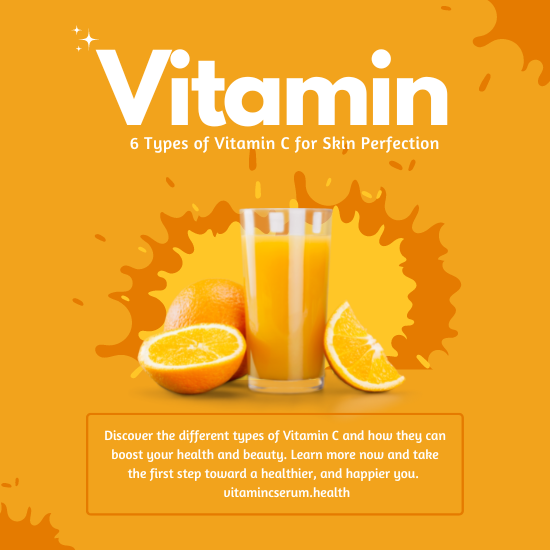
Now that you know the six most effective types of Vitamin C for skin perfection, You may be wondering how to incorporate them into your skincare routine. Here are some tips for using Vitamin C in your daily routine:
- Use a Vitamin C serum: A Vitamin C serum is a concentrated formula that’s designed to be applied to your skin after cleansing and toning. Look for a serum that contains one or more of the given types of Vitamin C. Those are some of the most effective and stable forms of Vitamin C, Which means they’ll stay potent for longer and be more effective at improving your skin’s health.
- Use a Vitamin C-infused moisturiser: In addition to using a Vitamin C serum, try incorporating a moisturiser that contains Vitamin C into your routine. This can help to hydrate your skin while also brightening it and improving its overall texture. Look for products that contain other antioxidants, Such as Vitamin E, For even more skin-protecting benefits.
- Use a Vitamin C mask: A Vitamin C mask is an easy way to give your skin an extra boost of this powerful ingredient. Look for masks that contain high levels of Vitamin C and leave them on for 10-15 minutes, Depending on the instructions. This can help to brighten your complexion and give your skin a more radiant appearance.
- Incorporate Vitamin C-rich foods into your diet: In addition to using Vitamin C products topically, You can also improve your skin’s health by incorporating Vitamin C-rich foods into your diet. Some great options include oranges, Strawberries, Kiwi, Broccoli, And red bell peppers. Eating a healthy diet that’s rich in antioxidants can help to protect your skin from the inside out.
How to Choose the Best Vitamin C Serum for Your Skin Type: A Comprehensive Guide
NOTE:
Remember, consistency is key when it comes to seeing results from your skincare routine. Try to incorporate these tips into your daily routine for at least a few weeks to see the full benefits of using Vitamin C. With a little patience and persistence, You can achieve brighter, Healthier-looking skin that you’ll love.
FAQs related to Types of Vitamin C for Skin Perfection
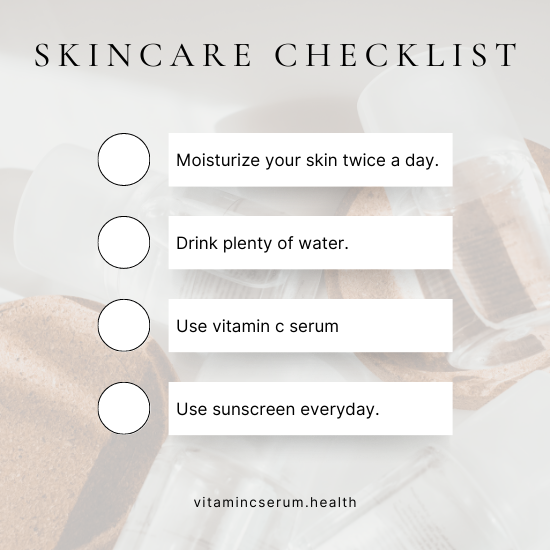
Q: Can I use Vitamin C products if I have sensitive skin?
A: Yes, you can still use Vitamin C products even if you have sensitive skin. However, It is important to patch test any new product before using it on your entire face. Start by applying a small amount of the product to a small area of skin and wait 24 hours to see if there is any adverse reaction. If you experience any redness, Itching, Or irritation, Discontinue use of the product.
Q: Can I use Vitamin C products with other active ingredients?
A: Yes, you can use Vitamin C products with other active ingredients in your skincare routine. However, It is important to introduce new products slowly to avoid overwhelming your skin. Start by using one new product at a time, And wait a few weeks before introducing another new product. This will give your skin time to adjust to each new product.
Q: How often should I use Vitamin C products?
A: You can use Vitamin C products once or twice a day, Depending on your skin’s needs. If you have dry skin, You may want to use a Vitamin C serum in the morning and a Vitamin C-infused moisturiser at night. If you have oily skin, you may want to use a Vitamin C serum at night and a Vitamin C-infused moisturiser in the morning. It is important to listen to your skin and adjust your routine as needed.
Q: Can I use Vitamin C products if I have acne-prone skin?
A: Yes, You can use Vitamin C products if you have acne-prone skin. In fact, Vitamin C can help reduce inflammation and improve the overall appearance of acne-prone skin. However, It is important to patch test any new product before using it on your entire face. Start by applying a small amount of the product to a small area of skin and wait 24 hours to see if there is any adverse reaction. If you experience any redness, itching, Or irritation, Discontinue use of the product.
Q: Can I get enough Vitamin C from my diet, or do I need to use Vitamin C products?
A: While it is important to eat a diet rich in Vitamin C, It can be difficult to get enough Vitamin C to see a noticeable improvement in your skin’s appearance. Using Vitamin C products can provide a concentrated dose of Vitamin C to your skin, Helping to improve its overall health and appearance. However, It is important to remember that skincare is just one part of a healthy lifestyle. Eating a balanced diet, Getting enough sleep, And staying hydrated are also important for achieving healthy, glowing skin.
Conclusion
In conclusion, Adding Vitamin C into your skincare routine can help improve the overall health and appearance of your skin. There are many different types of Vitamin C, Each with its own unique benefits. When choosing a Vitamin C product, look for one that contains one or more of the types of Vitamin C discussed in this article for maximum effectiveness.
By incorporating Vitamin C into your daily routine, You can achieve skin perfection and a flawless complexion. I hope this article has been helpful in educating you about the different types of Vitamin C for skin perfection. If you have any additional questions or concerns, Please consult with a dermatologist or skin care professional.
Remember, Taking care of your skin is an important form of self-care, And incorporating Vitamin C into your skincare routine can help you achieve your best skin yet!



